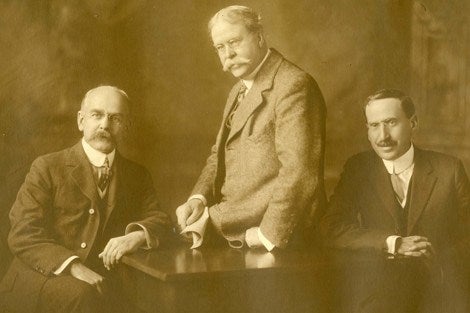A century of leadership
George Whipple, William Sedgwick, and Milton Rosenau
Founders, 1913–1922
“This is a historic meeting, the beginning of what will be a great School.” So wrote George C. Whipple after a 1913 meeting of the administrative board of the fledgling Harvard–MIT School for Health Officers—which, in 1922, would become Harvard School of Public Health. An unusual triumvirate of scientists—Whipple, William T. Sedgwick, and Milton J. Rosenau, collectively known as The Founders (left to right, above)—made it all possible. Sedgwick, a renowned MIT biologist, served as chair; Rosenau, a Harvard Medical School professor and head of the Department of Preventive Medicine and Hygiene, became director of the School; and Whipple, Harvard professor of sanitary engineering, was secretary and treasurer. Sedgwick died in 1921, just hours after representing MIT at a State House meeting on education. Rosenau led HSPH’s epidemiology program from 1922 through 1935, then left Harvard to help establish the public health school at the University of North Carolina, Chapel Hill; he died in 1946. Whipple taught sanitary engineering courses at HSPH until his death in 1924.
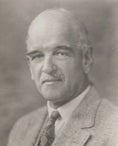 David Linn Edsall
David Linn Edsall
Dean, 1922–1935
Dean of Harvard Medical School since 1918, David Linn Edsall was appointed dean of the newly independent HSPH in 1922 and led both institutions through his retirement in 1935. Sanitary engineering, tropical medicine, and industrial medicine were major areas of research and training at HSPH under Edsall’s leadership. In his own lab, Edsall studied metabolism, hygiene and sanitation, and the health effects of extreme heat. Cecil Drinker, who would succeed Edsall as dean, said of his predecessor, “He believed the profession of public health should be given a chance to find itself and should show that it could captivate the imagination of the best medical and engineering brains.” Edsall died in 1945.
 Roger I. Lee
Roger I. Lee
Acting Dean, 1922–1923
Roger I. Lee chaired the special committee empowered in 1921 to plan the newly endowed, independent Harvard School of Public Health. For his prescient leadership, Lee, the Henry K. Oliver Professor of Hygiene, has been dubbed the “Father” of HSPH. Lee served as acting dean during David Edsall’s travel to Europe on educational surveys.
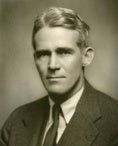 Cecil Kent Drinker
Cecil Kent Drinker
Dean, 1935–1942
Cecil Kent Drinker, professor of physiology at Harvard Medical School and at HSPH from 1923 to 1935, was an expert in industrial and work-related illnesses and hygiene. He discovered that steel mill workers became sick by inhaling manganese dust and fumes. Drinker determined that women painting luminous watch and clock dials were being poisoned from the radium-based paint they used. During World War II, his research on respiratory physiology led to the development of high-altitude oxygen masks and goggles for aviators. As HSPH’s first full-time dean, he expanded enrollment, admitted women as degree candidates for the first time, and raised admission criteria. After stepping down as dean, Drinker lectured at Cornell Medical School from 1948 to 1949 and served as a consultant to industrial organizations and the U.S. Navy from 1951 to 1953. He died in 1956.
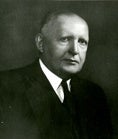 Edward G. Huber
Edward G. Huber
Acting Dean, 1942–1946
A former U.S. Army medical officer who commanded a hospital center in France during World War I, Edward G. Huber earned a doctorate at HSPH in 1925, while stationed in Boston. After retiring from the Army, he became an epidemiologist for the Massachusetts Department of Public Health and began teaching at HSPH. Named acting dean in 1942, after Cecil Kent Drinker resigned due to illness, Huber shouldered the difficulties of the World War II years—a depleted faculty, low numbers of students, and limited supplies. Yet he taught classes, fostered instruction and research in new branches of public health, and helped obtain funds from the Rockefeller Foundation that paved the way for the School to become fully autonomous from Harvard Medical School on July 1, 1946. Huber, sadly, did not live to see the School’s independence. He died suddenly several weeks later.
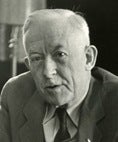 James Stevens Simmons
James Stevens Simmons
Dean, 1946–1954
During a 30-year career in the U.S. Army, from 1916 to 1946, James Stevens Simmons, DPH ’39, studied malaria, dengue, and other tropical scourges and developed a preventive medicine program that safeguarded the health of more than 9 million U.S. soldiers during World War II. He also served as chief of the Preventive Medicine Service in the Army’s office of the Surgeon General from 1940 to 1946. At HSPH, he led an aggressive fundraising effort and helped create, with donor funding, the first-ever named professorship at HSPH, in honor of tropical medicine pioneer Richard Pearson Strong. Simmons also advocated for an expanded national commitment to train public health professionals. He wrote in 1953, “We must build up the nation’s health in order to ensure its future strength and security, and we must work for an improvement of world health in the hope of ensuring a lasting world peace.” Simmons died of a heart attack in 1954 at age 64, while serving as dean.
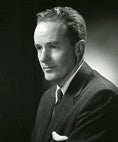 John C. Snyder
John C. Snyder
Dean, 1954–1971
John C. Snyder modernized and expanded HSPH during his 17-year tenure at the School. He quadrupled the endowment, doubled the size of the faculty, and transformed the School’s physical plant from antiquated former hospitals to three modern buildings along Huntington Avenue. As a lieutenant colonel in the Army Medical Corps during World War II, Snyder helped develop new treatments for typhus. He began at HSPH in 1946 as head of the Department of Public Health Bacteriology. As dean, he established departments of demography and human ecology, behavioral sciences, and the University-wide Center for Population Studies. Interviewed in this magazine in 1997, Snyder said, “The thing that I am proudest of is what the students did—and are doing—in various parts of the world.” After stepping down, Snyder held a professorship in population and public health and advised on developing health programs in the Middle East. He died in 2002 at age 91.
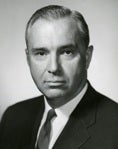 Richard H. Daggy
Richard H. Daggy
Acting Dean, 1971–1972
Working in Dhahran, Saudi Arabia, for the Arabian American Oil Company for 17 years, entomologist Richard H. Daggy led preventive medicine efforts and served as medical director for the company. He helped establish standards for sanitation, pest control, and communicable disease prevention—including an effective malaria control and eradication program. Daggy was invited in 1954 to become a lecturer at HSPH, where he taught both entomology and tropical public health. In 1964, he became assistant dean for international programs; in 1968, associate dean; and in 1971, acting dean. Daggy retired from the faculty in 1981 and died in 2001.
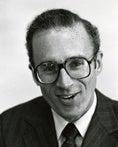 Howard Hiatt
Howard Hiatt
Dean, 1972–1984
Trained in clinical medicine, biochemistry, and molecular biology, Howard Hiatt has served in a number of positions on the Harvard University faculty, beginning in 1955. As physician-in-chief at Beth Israel Hospital from 1963 to 1972, he recruited
physician-scientists to apply new scientific knowledge to patient care and extended the hospital’s involvement in Boston’s inner city. At HSPH, Hiatt bolstered quantitative analytic sciences, introduced molecular and cell biology into the School’s research and teaching, initiated programs in health policy and management, and fostered crossdisciplinary research. Since 1985, he has been professor of medicine at Harvard Medical School and senior physician at Brigham and Women’s Hospital. Hiatt played a major role in the success of Partners in Health, a Harvard-affiliated nonprofit that works with resource-deprived countries to fight disease and poverty. He serves as deputy director of the Brigham’s Global Health Equity Division of the Department of Medicine. In an October 2011 video interview, part of the History of the School Project, Hiatt said, “I see public health as an area that requires, first and foremost, a concern for human rights.”
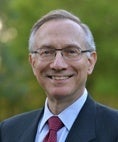 Harvey Fineberg
Harvey Fineberg
Dean, 1984–1997
A 24-year veteran of the School with four Harvard degrees—AB ’67, MD ’72, MPP ’72, and PhD ’80—Harvey Fineberg presided as dean over rapid growth in the numbers of students and faculty, in the budget, and in fundraising. An expert on medical innovation and change, Fineberg has provided insight on issues such as the best way to introduce new medical technology, how to decide which treatments to use in complex situations, and how to respond to emerging infections. He was instrumental in organizing Harvard University’s response to the early HIV/AIDS epidemic and in establishing, with Countess Albina du Boisrouvray, the FXB Center for Health and Human Rights. On his appointment as Harvard provost, Mark Rosenberg—then-director of the U.S. Centers for Disease Control and Prevention’s National Center for Injury Prevention and Control—said that the secret of Fineberg’s success “is his relentless optimism and the incredibly creative and productive force it generates.” Fineberg left his HSPH deanship to become provost of Harvard and later president of the Institute of Medicine. Fineberg is now president of the Gordon and Betty Moore Foundation, having left his role as president of the Institute of Medicine in 2014.
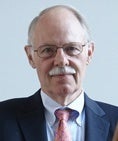 James Ware
James Ware
Acting Dean, 1997–1998
Biostatistician James Ware spent a year as acting dean after Harvey Fineberg was appointed Harvard provost. Ware later returned to his role as HSPH’s Dean for Academic Affairs, a position he held from 1990 to 2008. In the 1980s, as a co-investigator for the Six Cities Study of Air Pollution and Health, Ware developed statistical methods for the design and analysis of longitudinal studies on the health effects of air pollution. For many years he was Frederick Mosteller Professor of Biostatistics and later became associate dean for clinical and translational science. James Ware passed away in 2016.
 Barry Bloom
Barry Bloom
Dean, 1999–2008
As an internationally recognized expert in immunology and infectious diseases, Barry Bloom, Joan L. and Julius H. Jacobson Professor of Public Health, has used both scientific evidence and advocacy to fight such global diseases as tuberculosis, malaria, and AIDS. As HSPH Dean, Bloom made student financial aid a top priority; during the course of his 10-year tenure, student funding increased nearly threefold. He boosted active learning and case-based teaching, oversaw new public health initiatives in Africa, India, China, and the Mediterranean region, and emphasized such fields as genes and the environment, quantitative social sciences and bioinformatics, and global health. During his 1999 inaugural address to the School community, Bloom said, “I believe the Harvard School of Public Health has to be the ‘Public Health School for the Nation and the World.’ ” Bloom continues to pursue bench science as the principal investigator of a laboratory researching the immune response to tuberculosis, an infection that claims more than 2 million lives each year. He also co-leads the School’s introductory doctoral course on global health and population and an undergraduate course at Harvard College on global threats to health.
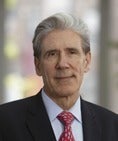 Julio Frenk
Julio Frenk
Dean, 2009–2015
Before becoming dean at HSPH, Julio Frenk served from 2000 to 2006 as minister of health in Mexico, where he oversaw health system reform that redressed social inequality and extended health care coverage to some 50 million previously uninsured people. Earlier in his career, he established the National Institute of Public Health of Mexico. In scholarly articles and in the media, Frenk—who is also T & G Angelopoulos Professor of Public Health and International Development at HSPH and Harvard Kennedy School—has underscored the importance of the vast health transition currently underway throughout the world. He has also championed the idea that health is central to economic development, national security, democratic governance, and human rights. At HSPH, he has shepherded new educational initiatives, including online offerings through HarvardX. In a Q&A in this magazine in 2009, Frenk said, “Good evidence can be translated into policy and practice. Evidence is the light that must illuminate our path.” Frenk left his deanship in 2015 to become President of the University of Miami.
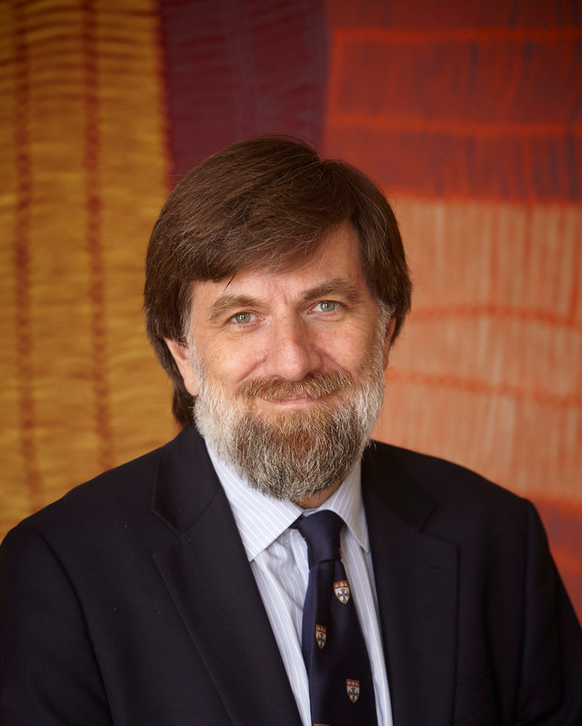 David Hunter
David Hunter
Acting Dean, 2015-2016
David Hunter, Vincent L. Gregory Professor in Cancer Prevention, served as Dean for Academic Affairs from 2009–16 and was appointed Acting Dean of the Faculty in 2015. During Hunter’s tenure as Acting Dean, Harvard Chan School opened a new center in Mumbai; launched a new online/on-campus MPH in epidemiology degree; opened a new Center for Health and Happiness; and relaunched and expanded the John B. Little Center for Radiation Sciences. During Hunter’s time as Dean for Academic Affairs, the School increased the number of women professors by more than 50% and doubled the number of faculty members from underrepresented minority groups. Dean Hunter’s research interests are the etiology of cancer, particularly breast, colorectal, and prostate cancers.
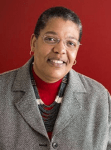 Michelle A. Williams
Michelle A. Williams
Dean, 2016–present
An internationally renowned epidemiologist and public health scientist, Dean Williams previously was Professor and Chair of the Department of Epidemiology at Harvard Chan School and Program Leader of Harvard’s Clinical and Translational Sciences Center (Harvard Catalyst) Population Health and Health Disparities Research Programs. Prior to coming to Harvard, she was a professor of epidemiology at the University of Washington School of Public Health, where she developed and directed the Reproductive Pediatric and Perinatal Training Program and also started an NIH-funded program that provides support for U.S. students from underrepresented minority groups to participate in international field experiences. In Seattle, Williams was also active in the Center for Perinatal Studies at the Swedish Medical Center and was an affiliate investigator at the Fred Hutchinson Cancer Research Center. Dean Williams’ research has focused on reproductive, perinatal, pediatric, and molecular epidemiology. She has carried out large-scale epidemiological studies examining genetic and environmental causes of adverse pregnancy outcomes and other non-communicable disorders along the life course.
